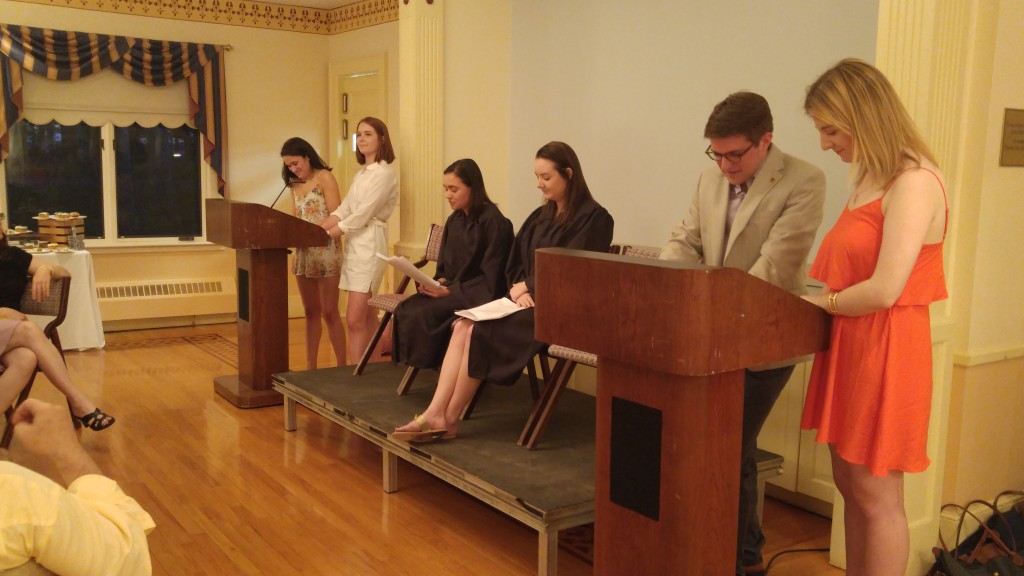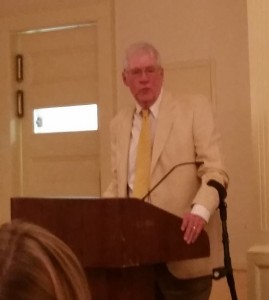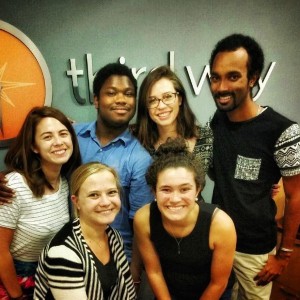By Brendan W. Clark ’21
Editor-in-Chief
Shaun Casey is the Director of the Berkeley Center for Religion, Peace, and World Affairs, a professor of the practice at Georgetown University’s Walsh School of Foreign Service, and the former head of the U.S. State Department’s Office of Faith-Based Community Initiatives. Casey is also the author of The Making of a Catholic President: Kennedy v. Nixon.

Shaun Casey, former head of the State Department’s Office of Faith-Based Community Initiatives, speaks while Secretary of State John Kerry looks on. Photo courtesy of the United States Department of State.
This year, Shaun Casey is the Leonard E. Greenberg Center for Religion in Public Life Distinguished Scholar in Residence. Casey has spoken to classes throughout the week and spoke during a lecture on Tuesday to Trinity students and faculty on the development and treatment of religion and diplomacy under former President Barrack Obama and current President Donald J. Trump. Specifically, Casey shared reflections of how religion was addressed under John Kerry’s State Department, where he was the head of the Office of Faith-Based Community Initiatives.
In addressing his own history, Casey described his advising of Kerry on religion following his loss in the 2004 Presidential campaign. Casey maintained his relationship with Kerry and, in 2013, was invited to launch the Office, which was made possible through executive orders passed under the Bush administration and expanded under the Obama administration. At this time, Casey was given National Security permission from the White House to engage religious officials worldwide in diplomatic endeavors and was subsequently tasked with advising the 70,000 staff members of the State Department on religious questions worldwide.
Casey described these first days as “some of the most daunting” of his life. Casey characterized the disarray of his beginnings by describing his office: at first, he said, he “had a desk, telephone, a nonfunctional computer, and a wastebasket.” His first action was to hire a chief of staff and begin to recognize what issues existed in the State Department’s understandings on religion.
Thereafter, he recognized that foreign agents had an outstanding ability with respect to being able to “understand regional politics, business, economics, and history,” but fundamentally lacked a working knowledge of religion. Casey attributed this to a deficit of “energy and reward” for understanding religion in a diplomatic context.
After identifying the deficiencies, Casey sought to gain trust and thereafter built relationships with the Assistant Secretaries of the six different world regions, working with them to identify how religion could be co-opted into their various strategies. Eventually, said Casey, the concrete benefits that could be attained by adding religion to their “strategic initiatives helped them get over their initial reticence.”
Casey cited three reasons why religion is a fundamental component of diplomacy, viz: “religion is a powerful force across the world and is neither always good nor always bad”; “if you make mistakes in misunderstanding religion, it can be extremely costly”; and “religion is diabolically complicated.” Casey cited as an example the 2003 Invasion of Iraq as an incident where fundamental misunderstandings on religion contributed to costly outcomes. Casey also emphasized that the complicated nature and divisions of religion make it an issue that can be best managed on a regional level.
He also cited some of the public policy and regional issues that his Office sought to address, noting the following as critical during his tenure:
- Israel/Palestine Conflict
- Myanmar
- Cyprus and conflicts between the Muslim north and the Greek Orthodox south.
- Ukraine
- Iraq
Casey described in detail his work on the Israel-Palestine conflict, describing how the interactions his Office undertook were the first of their kind, noting the surprise as one leader told Casey that he had been “waiting for you for 40 years.” Casey described the process as tense but added that it was critical that he “go to the region and engage Jewish, Muslim, and Christian leaders in an open discussion of their opinions.” Casey’s office continued to urge all sides to speak candidly about their positions and added that the “leaders were happy that someone understood their community.”
In discussing another key policy development, Casey described his work with refugees. Casey worked closely with the nine organizations that handle refugee resettlement, noting that six of them were religiously affiliated. While touring these organizations, Casey witnessed a “new form of interreligious dialogue,” but was also witness to the difficulties refugees face, noting that one man “feared for his family while walking on the sidewalk as a result of his Muslim identity.” Casey described this experience as rewarding and enlightening.
On the Trump era, Casey stressed the significance of a lack of a “coherent doctrinal strategy” and noted that his office had been discontinued under the present administration. Further, he noted the public policy conundrum formed by President Trump’s declaration that “we are not going to tell [Saudi Arabia] how to run your country.” Casey also touched upon Trump’s decision to move the American Embassy to Jerusalem, remarking that it effectively leaves the “two-state solution hanging by a thread.” Casey noted that the loss of his Office is especially troubling in light of increasing “public and violent incidences of antisemitism.” He also noted the instability of North Korea and its proximity to the major Christian nation of South Korea as well as the instability of the religious regime in Iran.
Further, Casey touched upon the increasing deference to Christian fundamentalism under the Trump administration but added that he nevertheless remains hopeful that the Office of Faith-Based Initiatives may reappear in the future.
Casey’s reflection indeed leaves us with much to consider. How do we understand the significance of religious affairs in diplomacy? In what ways does the disappearance of this office reduce America’s bargaining power? How does religion shape fundamental relationships between countries and regions?
As Casey reminds us, “religion is a driver of change, religious actors transact that change and religious leaders are at the frontline of continuing that change.” In this way, religion is indeed an indispensable component of the diplomatic process.







